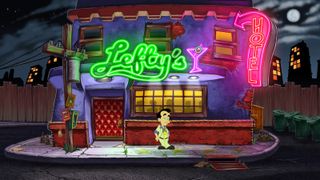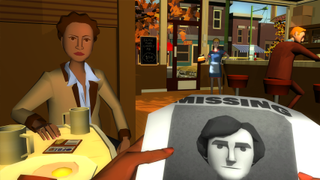The most controversial PC games
A deep dive into Metacritic data unearths the PC games that were loved and hated in equal measure.

If there's one thing Metacritic user reviewers are good at, it's absolutely hammering critics. Just look at this evisceration in a 2013 review for Leisure Suit Larry: Reloaded: "Absolutely dreadful reviews score by 'knowledgeable' critics 57% (currently), that is only 40% higher than Leisure Suit Larry: Box Office Bust, now that is beyond a joke," writes a user on Metacritic. Ouch. That's the kind of takedown you'll regularly run into when digging through Metacritic data to find the games that are most loved by users but got panned by critics. Leisure Suit Larry: Reloaded sits proud at the top of that list, with an average critic score of 56 but a user score of 8.3. (On Metacritic, reviews are scored from 0-100, user scores from 0-10.)
Larry's hardly alone, and for fun we've been digging through a trove of Metacritic data collected by our friends at Kotaku UK. They put together info on more than 18,000 games to find the most popular with critics and users (on PC, The Orange Box and Half-Life 2 own the top of the chart) as well as the most controversial. What games did users love that reviewers hated? What games were simply controversial, period, with reviews all over the map?
My favorite category is the user favorites, where Larry Laffer reigns supreme. Keep in mind this data goes back to the early 2000s and is limited to games with at least 30 reviews, in order to provide a large enough sample size. Here are the top 15 games that users showered with love while reviewers were… a bit less enthusiastic.
PC games user reviewers loved more than critics
- Leisure Suit Larry: Reloaded — Review average: 58.8, user average: 8.3.
- Rise & Fall: Civilizations at War — Review average: 63.8, user average: 8.7
- Counter-Strike: Condition Zero — Review average 65.6, user average 8.7
- Krater — Review average 54.2, user average 7.2
- Deadfall Adventures — Review average 54.3, user average 7.1
- Singles: Flirt Up Your Life — 58.4, user average 7.5
- Tesla Effect: A Tex Murphy Adventure — Review average 68.4, user average 8.5
- Infernal — Review average 59.8, user average 7.6
- Tycoon City: New York — Review average user average 8.3
- Auto Assault — Review average 71.5, user average 8.6
- Killing Floor — Review average 71.8, user average 8.6
- Bound by Flame — Review average 55.2, user average 6.9
- Mars: War Logs — Review average 59.2, user average 7.2
- Scrapland — Review average 72.5, user average 8.5
- Serious Sam HD: The First Encounter — Review average 68.7, user average 8.1
The most surprising of the bunch today is probably Counter-Strike: Condition Zero, given Counter-Strike's reputation and enduring popularity. But if you look back, Condition Zero, largely a remake of 1.6, was not well received by critics and was delayed multiple times, finally releasing in 2004. It was overshadowed by Counter-Strike: Source not long after. Most of the user reviews came after that release, and are likely more positive thanks to post-launch updates.
The least surprising of the bunch is probably Singles: Flirt Up Your Life, a mediocre Sims knock-off with a name that practically shouts "hard pass." Metacritic user RichardW disagreed: "I think it's a great game. This thing about not blurring the bad things up is great. i hope lots of people like it too."
If there's one where I'd say the users really got it right, it's Killing Floor. On release, Killing Floor scored decently, but its 30 critic reviews and 1405 user reviews show where Tripwire found its strength: in years of post-release support, making Killing Floor a bigger, better game, and one of the best co-op shooters on PC. It wasn't pretty, but it could run on a wide range of PC hardware, opening it up to a huge audience of wannabe zed killers.
As for the Tex Murphy fans… sorry, gang, if Richard Cobbett says your adventure game isn't up to snuff, we're gonna roll with him.
The biggest gaming news, reviews and hardware deals
Keep up to date with the most important stories and the best deals, as picked by the PC Gamer team.

The most controversial PC games
Weirdly enough, Leisure Suit Larry shows up again in the most controversial PC games on Metacritic—those with review scores all over the map.
- X3: Reunion — Review average 73.4, standard deviation 18.9
- The Beginner's Guide — Review average 74.5, standard deviation 18.6
- Leisure Suit Larry: Magna Cum Laude — Review average 59.7, standard deviation 18.4
- Disciples III: Renaissance — Review average 56.6, standard deviation 17.9
- Sunset — Review average 65.9, standard deviation 17.9
- Virginia — Review average 74, standard deviation 17.9
- Star Wars Galaxies: An Empire Divided — Review average 70.2, standard deviation 17.6
- Goat Simulator — Review average 63.4, standard deviation 16.8
- Duke Nukem Forever — Review average 54.7, standard deviation 16.6
- Gothic 3 — Review average 63.4, standard deviation 16.6
- Moebius: Empire Rising — Review average 55.6, standard deviation 16.6
- SimCity — Review average 65.6, standard deviation 16.3
- Total War: Rome II — Review average 77.4, standard deviation 16.2
- Singles: Flirt Up Your Life — Review average 58.4, standard deviation 16.2
- Dear Esther — Review average 76.3, 16.2
Singles: Flirt Up Your Life snuck onto this list as a repeat customer! What was controversial 15 years ago looks pretty tame—though still completely stupid—today. Really, how can you listen to this theme song and not just laugh this game out the door. The utterly distasteful Leisure Suit Larry: Magna Cum Laude, by comparison, I think really earned its place on the list. As a PC Gamer reviewer wrote back in 2004: "It's one thing to make a bad game - that I can forgive. It's worse to take one of the great PC game franchises and ruin the hell out of it. This isn't Leisure Suit Larry - it's just annoying softcore porn." The score? A 39. The website Game Chronicles helps explain the standard deviation with a 90, writing "Relax, pick up that bong, and enjoy the ride."
The interesting games on this list aren't controversial for their sexual content, but for being the kinds of games critics tend to like and some gamers tend to deride. Our review of Sunset said its "themes, setting, and plot are plenty interesting, but the player's interaction with them feels incongruous." But user reviews on Metacritic hated it, some dismissively calling it a walking simulator. Dear Esther naturally got the same criticisms, bringing up the old "is it really a game?" argument. (I say yes, and who cares, and get over it).

Virginia boldly tells a story with no dialogue, which some critics loved—RPG Fan called it "intensely intimate, powerful and thought-provoking"—while Kill Screen gave it a 30, and spent a lot of time talking about Soviet film theory to explain why Virginia is boring. The Beginner's Guide either struck you as brilliant commentary on the artistic process, or, like our reviewer Tyler, "a peculiar experience that's personal, sincere, and full of questions to unpack, though it asks them far too bluntly."
Out of this bunch, I'd like to extend the "wow, I forgot this existed" award to Moebius: Empire Rising, Jane Jensen's comeback adventure game from 2014. It didn't look terrible, but I think I played some of this game and I can't tell you anything about it.
"Most controversial" in this case means games with varying reviews, and thus doesn't really bring up the kinds of controversies we've written about in the past. In 2016, there was ARK's Scorched Earth expansion and the reaction to No Man's Sky. In 2017, it was loot boxes. Back in 2012, it was Mass Effect 3's ending.
Setting aside review scores, what would you rate as the most controversial PC games of all time?

Wes has been covering games and hardware for more than 10 years, first at tech sites like The Wirecutter and Tested before joining the PC Gamer team in 2014. Wes plays a little bit of everything, but he'll always jump at the chance to cover emulation and Japanese games.
When he's not obsessively optimizing and re-optimizing a tangle of conveyor belts in Satisfactory (it's really becoming a problem), he's probably playing a 20-year-old Final Fantasy or some opaque ASCII roguelike. With a focus on writing and editing features, he seeks out personal stories and in-depth histories from the corners of PC gaming and its niche communities. 50% pizza by volume (deep dish, to be specific).
Most Popular

